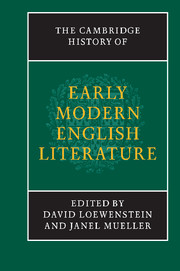Book contents
- Frontmatter
- Introduction
- 1 Modes and means of literary production, circulation and reception
- 2 The Tudor era from the Reformation to Elizabeth I
- 3 The era of Elizabeth and James VI
- 4 The earlier Stuart era
- 5 The Civil War and Commonwealth era
- 21 Literature and national identity
- 22 Literature and religion
- 23 Literature and London
- 24 Literature and the household
- 25 Alternative sites for literature
- 26 From Revolution to Restoration in English literary culture
- Chronological outline of historical events and texts in Britain, 1528–1674, with list of selected manuscripts
- Select bibliography (primary and secondary sources)
- Index
- References
21 - Literature and national identity
from 5 - The Civil War and Commonwealth era
Published online by Cambridge University Press: 28 March 2008
- Frontmatter
- Introduction
- 1 Modes and means of literary production, circulation and reception
- 2 The Tudor era from the Reformation to Elizabeth I
- 3 The era of Elizabeth and James VI
- 4 The earlier Stuart era
- 5 The Civil War and Commonwealth era
- 21 Literature and national identity
- 22 Literature and religion
- 23 Literature and London
- 24 Literature and the household
- 25 Alternative sites for literature
- 26 From Revolution to Restoration in English literary culture
- Chronological outline of historical events and texts in Britain, 1528–1674, with list of selected manuscripts
- Select bibliography (primary and secondary sources)
- Index
- References
Summary
In the later 1630s, as he was writing Religio Medici, Sir Thomas Browne proclaimed England’s transcendent nature: ‘All places, all ayres make unto me one Country; I am in England, every where, and under any meridian.’ Such relaxed confidence in what England stood for, and its ability to overcome local distractions and inconveniences, may seem characteristic of the Caroline peace; it surely became untenable by the time Browne’s book was published, in 1643. By then, everything England stood for – its past, its present, its future, not to mention the geopolitical implications of its location among the islands at the edge of the European land-mass – was a matter of war. If Browne and his England were somehow immanent, transcending the world, it was not long before John Milton sharply raised the stakes, only to seem to throw over the game altogether shortly thereafter. To Milton at the start of England’s troubles, the nation as nation had deep apocalyptic purpose. In Of Reformation (1641), he prophesied that Christ would ‘judge the severall Kingdomes of the World, … distributing Nationall Honours and Rewards to Religious and just Common-wealths’. Further, he proclaimed the next year in The Reason of Church-Government, the nation was also the divinely ordained agent of cultural regeneration, for ‘all the kinds of Lyrick poesy, … the inspired guift of God rarely bestow’d …, [are instituted] in every Nation: and are of power beside the office of a pulpit to imbreed and cherish in a great people the seeds of vertu, and publick civility’.
- Type
- Chapter
- Information
- The Cambridge History of Early Modern English Literature , pp. 631 - 663Publisher: Cambridge University PressPrint publication year: 2003

